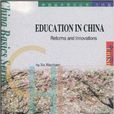基本介紹
- 書名:中國教育:改革與創新
- 作者:蘇曉環
- 出版社:五洲傳播出版社
- 頁數:190頁
- 開本:32
- 外文名:Education in China:Reforms and Innovations
- 譯者:陳耕濤
- 出版日期:2002年5月1日
- 語種:英語
- ISBN:9787801139931
內容簡介
圖書目錄
Chapter I Past and Present
Chapter II Elementary Education
Preschool Education
Compulsory Education
Special Education
Chapter III Vocational Education
Development of Vocational Education
Varieties of Vocational Education
School System and Administrative
System for Vocational Education
Curricula and Teaching for
Vocational Education
Chapter IV Higher Education
Development of Higher Education
School System and Administrative
System For Higher Education
Higher Education's Enrollment System and
System of Job Assignment for Graduates
Curricula and Learning
Speciality and Course Reforms
Scientific Researches
Public Service System
Graduate Education and Academic
Degrees System
Chapter V Adult Education
Development of Adult Education
Literacy Education
Higher Education for Adults
Chapter VI Education for Ethnic Minorities
Education for Ethnic Minority People(EEMP)
Administrative System and Forms of
Education for Ethnic Minority People
Teacher Education for Ethnic
Minority People
Special Policies for Ethnic
Minority Education
Chapter Ⅶ Modern Distance Education
Development of Modern
Distance Education
Ways of Providing Distance Education
Modern Distance Education Enters
Traditional Education Domain
Chapter VIII Teacher Education and Teachers
Teacher Education
Teachers
Chapter IX International Exchangesand Cooperation
Studying Abroad
Education for Foreign Students
External Chinese-Language Teaching
Other Exchanges and Cooperation
Chapter X Education Funding System
Chapter XI Study of Education as a Science
Educational Research in China
Research Institutes and Researchers
Establishment of Disciplines
Research Results
Concluding Remarks
序言
Like most children in cities, my son entered kindergarten when he was 2.5 years old. Since the kindergarten is fairly distant from home, a year later, day care became "complete care" -my son came home for weekends only. At the kindergarten, the children mainly played and did games. When the kids were five to six years old, the teachers began teaching simple arithmetics and Chinese language pinyin (alphabetic system of writing). As a result, children having attended a kindergarten would have a comparatively easy time when they take grade-one courses in a primary school.
Children are required to attend schools close at home. My son spent six years in a primary school in the hutong (alley) where we live. Math and Chinese were the major courses. Other courses were English, nature, drawing, music and physical culture.
After graduation from the primary school, he entered a middle school attached to a college. It is a good school. But his strong interest in the computer, cartoons, pop music, cars and sports attracted his attention from more academic courses, and his academic record was not impressive. Upon graduation from junior middle school, he applied to both a regular senior middle school and a vocational senior middle school for further studies. My train of thoughts ran as follows: If he was enrolled by a regular senior middle school, he could go on to a college, and that would be the best of prospects.

